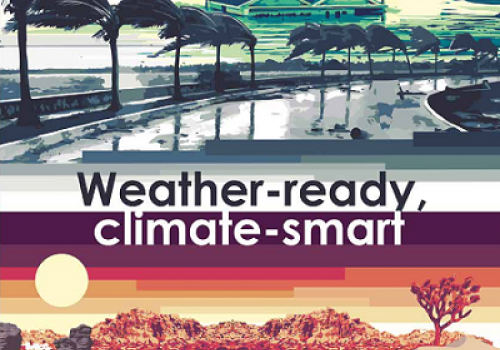Today, 23rd March 2018, the World Meteorological Organization is celebrating its 68th year under the theme; "Weather-ready, climate-smart". The World Meteorological Day is celebrated every year on 23rd March to commemorate the entry into force in 1950 of the convention that created the World Meteorological Organization. The Southern African Development Community (SADC) has customized the theme to; "Weather-ready and Climate-smart – the underlying success factors for the achievement of the SADC sustainable development Strategy".
The concept of "Weather-ready and Climate-smart" implies the use of the meteorological information that sustainably increases productivity, enhances resilience (adaptation), reduces Greenhouse Gas (GHG) emissions (mitigation) where possible, and enhances achievement of national and regional development goals.
From the outset, it is important to note that the SADC Region, just like the rest of the world, faces a wide range of hazards, among others, storms, flash floods, heatwaves, and droughts, sea level rise and ocean acidification. Long-term climate variation and change are increasing in intensity and frequency and the severity is expected to increase over time.
In this regard, meteorological services, which includes, weather and climate information is required for an effective and efficient tactical and strategic planning to mitigate against these impacts. The provision of climate services to the climate sensitive socio-economic sectors such as infrastructure in the water, transport and energy sectors during design and operational phase helps to prevent and minimize loss of investment resulting from the impact of adverse weather and climatic conditions.
SADC has taken climate services as one of its priorities. The revised Regional Indicative Strategic Development Plan (RISDP) 2015-2020 has identified Meteorology and Climate Change among others as key priority areas to foster sustainable development and the eradication of poverty. The RISDP recognizes that weather and climate information plays an important role as an underlying success factor to achieve the SADC Industrialization strategic goals along with all the value chains that are critical to support the industrialization drive. Adverse weather emanating from climate change and variable weather can disrupt transport and logistics, damage infrastructure and other physical assets, and in so doing, undermine the supply of raw materials that are the main ingredients along the various industrial value chains. Simply put, the RISDP acknowledges that all businesses, irrespective of size, location, products, and services, are prone to the devastating impacts of climate change and therefore rely on good and reliable weather and climate information to safeguard their sustainability.
To this end, SADC, with support from International Cooperating Partners (ICPs), has set up the regional early warning system at the SADC Climate Services Centre (CSC) based in Gaborone, Botswana. The Climate Services Centre provides services for monitoring and predicting extreme weather and climate conditions, and develops and disseminates meteorological, environmental and meteorological products that contribute to improved disaster risk management in the region, and in so doing, help to ensure that Member States are better prepared for weather and related climate disasters. Moving forward, there is still more work to be done to ensure that all SADC Member States are weather-ready and climate-smart.
Today, as we commemorate the World Meteorological Day, the SADC Secretariat is calling on Member States to work together in making businesses and communities in the Region "weather-ready and climate-smart" in order to achieve the SADC development agenda. As SADC embarks on industrialization, there is need to build climate resilience along the various regional value chains through the use and application of reliable climate services so as to ensure the attainment of sustainable socio-economic growth and development in the region.
Dr Stergomena Lawrence Tax
Executive Secretary of SADC

